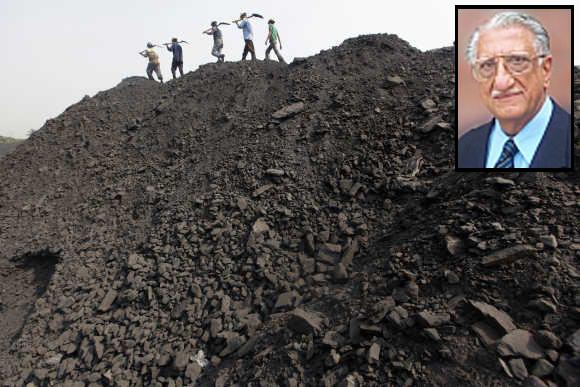
'The court would like to make the CBI politically neutral so that they behave as professionals and they are not influenced by somebody in power,' constitutional expert Anil Divan tells Sheela Bhatt
Anil Divan, senior lawyer and an expert on Constitution-related issues, has a distinguished track record of fighting against corruption in the highest court in the land. In the 1990s he gave assistance, as amicus curiae, to the Justice J S Verma-led bench in the Vineet Narain case, also known as Hawala case, in which top politicians and bureaucrats had been implicated for accepting bribes from the Jain brothers.
Divan's brilliant arguments to strengthen Indian democracy and his perseverance to expose the hidden aim of those in the seat of power to retain control over the Central Bureau of Investigation eventually convinced the court. The case led to the laying down of guidelines to make the CBI autonomous, with only its administrative control vesting with the Executive.
As the government formed yet another Group of Ministers this week under the chairmanship of P Chidambaram to deliberate upon granting CBI functional autonomy, as directed in a recent Supreme Court order in the coal blocks allotment case, Rediff.com's Sheela Bhatt got Divan to reflect upon the CBI, the government, and the law officers' role in the court case into the coal allotment.
You were connected to the Vineet Narain case when guidelines were issued by the Supreme Court. Long after it a new order has arrived, in the case of the alleged irregular allotment of coal mines, from the Supreme Court asking the government to take certain steps to make the CBI independent. Can you help us understand this written order? What does it mean and how are things likely to move?
Let me talk about the last order and even the previous ones in this case. The court has said we want to go into two things. Should the licences and coal mines allocation that have been made be cancelled? Has the procedure been followed or are some people been favoured? The court says we will look into the question whether it should be cancelled. That's the number one issue.
The second thing is, after deciding first the issue of coal allocation, we will then go into the question of criminality. Whether there was any criminality in these allocations. Now, in the last two-three sessions of the court in the coal allotment case, something more has occurred.
The court is monitoring and finds that if the CBI is unable to act against powerful persons then they would like to attempt and insulate the CBI further and make them free of such influences, and for that purpose, the first thing they said is let the attorney-general (Gulam Vahanvati) come out with some proposals and let the court know if the government proposes to pass a law as to how they want to do it and then the court will examine it.
Second, if the law is not adequate, then the Supreme Court itself wants to consider how they could move forward to make the CBI independent. I will use the word, politically neutral. The court would like to make the CBI politically neutral so that they behave as professionals and they are not influenced by somebody in power.
...
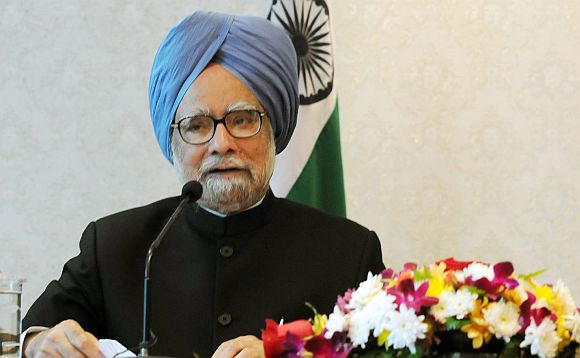
Anilbhai, former law minister Ashwani Kumar held a press conference where he declared that in the written order of the Supreme Court there is no adverse comment against him. Do you agree with his interpretation of the written order?
I won't say that. Because, one of the questions the judges have raised is the question related to the CBI. Is the CBI acting independently and is the order adverse about it (the CBI's role)? The court had directed the CBI that it will not share anything, any of their future reports, to either the law minister or the attorney general or even to any other advocate appearing for the government.
Now, that itself shows two things. That you have already interfered and, second, you shall not interfere.
A newspaper had a very interesting headline, that the buffer (Aswani Kumar) has gone and Dr Singh has now come in the line of fire. What is your interpretation of the PMO's role in the entire issue on the basis of what all has come on record?
You see, the coal ministry was headed by the prime minister from 2006-09 when several allocations have been made. Therefore, the question is, how far did the prime minister know? How far was he told?
Did the minister in charge, that is the prime minister, know... If he knew, what steps did he take to make the process transparent? If he did not know, who kept the thing away from him?
But, more importantly, why were officials of the coal ministry present in the meeting and who asked the CBI to change the draft? Why? Now that's the issue and to which I would ask a simple question to any lay person.
Suppose the police is investigating a crime against a bank Some bank officers have misappropriated things. They have cheated somebody and, say, the police or the CBI is investigating. The CBI makes an investigating report, and will it tell those same bank officials, "Please come and see my report. And, please change it"?
The first principle of law is that no lawyer and no investigator is to share things with the other side. Now, I as a lawyer cannot appear both for the prosecution and defence. So, how do lawyers who are in the coal or law ministry or the law officers of the government do these things together?
It's a direct conflict of duty. First, you are trying to influence the investigator to do something. On the other side you are appearing for the ministers or appearing for the government to save their position. So how can a lawyer appear for both sides? Can he get up in court before the magistrate and say, "I now make a speech for the police" and say such and such accused is at fault and this is the evidence so, "please now send accused to jail "?
Then the lawyer sits down. Then he, again, gets up and says, "Now I am appearing for the accused and whatever I have said on behalf of the police, is all wrong, please correct it."
This is actually happening in the coal case, and this can happen to lay persons, but how can this happen to a lawyer?
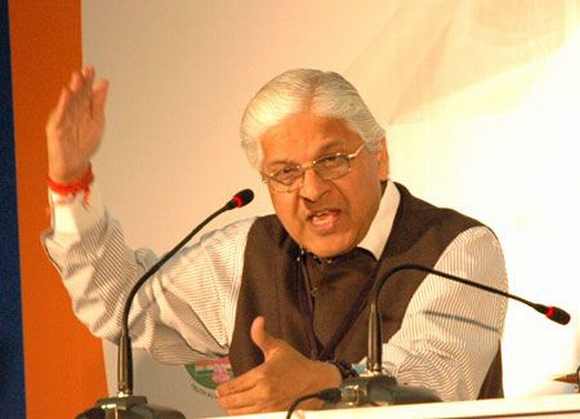
Opinions are divided. Some people say it's a question of impropriety on the part of Ashwani Kumar and the AG, Vahanvati, while some people say it's a bigger fault, maybe there's criminality involved. What is your view of that particular meeting that the law minister called -- the detail of it is already narrated in the CBI's submission before the court when it was asked to file its affidavit?
Now, the question is, what is the CBI doing? What is the court doing? The court is protecting the public interest, the public exchequer. That is the highest public interest of the Union of India. I am a citizen, you are a citizen, we all are citizens of India. We must see that public resources are not taken away in the wrong way. So, the highest interest is the public interest in a public litigation case which is being protected by the highest court.
Now, therefore, the instrumentality through which this public interest is to be protected is the CBI which is investigating the alleged wrongdoing in the coal allotment. Now, what is the public interest alleged to have been violated? It is about the coal allocation to certain people by the ministers and officials of the coal ministry.
So you have potential suspects and potential accused on one side and on the other side you have a duty to protect the public interest and see that nothing wrong has been done. Now, if there is public interest here and private interest there, then how can any lawyer or any public servant or any law officer who is supposed to be the guardian of public interest go and be on both sides?
So that meeting called by Law Minister Ashwani Kumar was wrong?
Not only was it wrong, it was a direct conflict of your duty and oath to the Union of India, to you, to me and his other duties. One of the duties of the minister is to find out the truth. Now, if he is representing the government as a minister as a guardian of public interest, then how can he interfere?
The argument goes that the law minister has, technically speaking, the right to talk to the CBI but, maybe, not in this particular case where the government is the accused. Otherwise it can call for a meeting. Right?
What I have told you above has nothing to do with the Vineet Narain case. It is common sense you can't be on both sides. Period. In the Vineet Narain judgment there is a clear statement that the CBI should not share details of its investigation.
Then, Chidambaram was a minister and he gave a note and his argument was that under Section 4 of the Delhi Police Establishment Act, they have the power of a superintendent. So they said I have the power of superintendent, I can call for details.
...
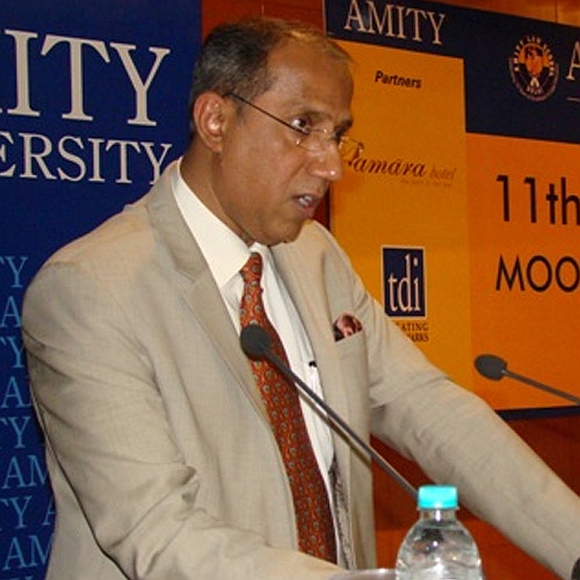
The judgment says very clearly, the Executive can generally call for policy, you can give general direction, but if a specific investigation is going on the government can neither interfere nor direct. The words are 'neither interfere nor direct'.
Why? Why? Because the police has to do according to the law, not according to what the law minister says and the English law is also very clear that every constable is to enforce the law and not to carry out the directions of the minister or the Crown.
Because if you are going against the ministers or the Crown or suspected ministers of the Crown, how can you follow their directions? Can an accused or potential accused tell the police how to investigate against himself? It is ridiculous.
Take a simple case. There is a dacoity. Are you going to ask the dacoit how should I investigate you? You can't do that.
So simple! So How do you read between the lines of Harin Rawal's letter?
He said he made an incorrect statement. In the last sentence he has said that he suspects he is trying to be made a scapegoat. That is important.
If Rawal's letter and the CBI's submission are read together, how do you judge AG Vahanvati's role?
Now, I don't want to go into personalities. What his role is... generally I have told you that the attorney general being a constitutional functionary, his greatest duty is to protect the public interest. Now, each one of you judge for yourself, whether in doing what he has done, has he protected the public interest?
How is his continuation in office tenable?
That you ask the prime minister. That I don't know.
Harin Rawal is saying it was Vahanwati who called him to that controversial meeting.
We don't know if what Haren Rawal is saying is right or wrong, because the attorney general has said he didn't call the meeting, it was the law minister who did so. Unless you know all the facts, it is very difficult to say what is right or wrong or what is the truth.
If Harin Rawal's resignation is desired, than why is Vahanvati's resignation not desired?
It is not desired obviously (says with sarcasm)... One is desired and the other is not desired (by the politicians). The issue is, who appoints them and who can call for their resignation? The person who appoints them can desire their resignation. One's resignation is desired and the other is not desired. It is not for you and me to desire.
...
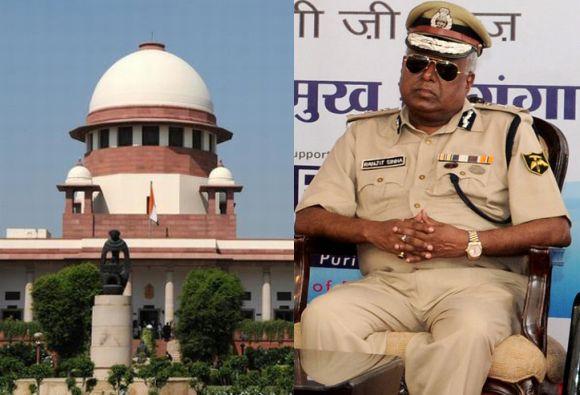
So, CBI director Ranjit Sinha, who marched with coal scam files to the law minister's office was to share details with representatives of the potential accused?
No, please don't overlook what Ranjit Sinha has said. He said I didn't have any choice. I am the government, I am not the authority. Now, once he believes that he is a servant of the government and once he believes that his duty is to the minister and not to the law and even though he knows some wrong has been committed, he still has to go by some external direction, that's his perception, then he is completely wrong and therefore I have said in some other interview also that the court can summon Sinha for cross-examination.
You can summon because there are so many points on which you can ask him questions. On his affidavit also. Please summon him and let him be cross-examined and then the truth will come out.
In the case, somebody says something, somebody else says something, somebody says something in a letter, somebody says something orally. The only affidavit made as of today is of the director of CBI. Therefore, the director should be called to justify the affidavit and ask questions. If I say something here and something there, sometimes it is lost... The precision is lost. It's not in writing, so it is very difficult to say what is the truth of the controversial meeting.
What will happen next?
I think the court is going to concentrate on three things. First, how can we, if Parliament does not do it or a law is not placed, how do we try and see that in the future this does not happen and how can the CBI be completely insulated from political interference? That is the main thing now.
Second thing is: should the coal allocation be set aside?
The third thing is to look into the allocation process. Was there any criminal liability?
Anilbhai, you know these guidelines are like sermons. It is being violated time and again. In the Vineet Narain case the judgment it was clear. There were guidelines but still this has happened. So, what makes you think that even if new guidelines come through things would change?
No, no... There are ways of doing things. If you read the Vineet Narain judgment, para 59 or something, you will know. There are ways and there are means of insulating the CBI from corrupt people. Making a particular investigation free from political influence is necessary.
That is exactly what they did in case of Bill Clinton and during Watergate. Because, in Watergate, in America, they got special public prosecution. So, the normal machinery was removed and a special set-up came into action. For Clinton also, they appointed an independent council because Clinton was at the top.
...
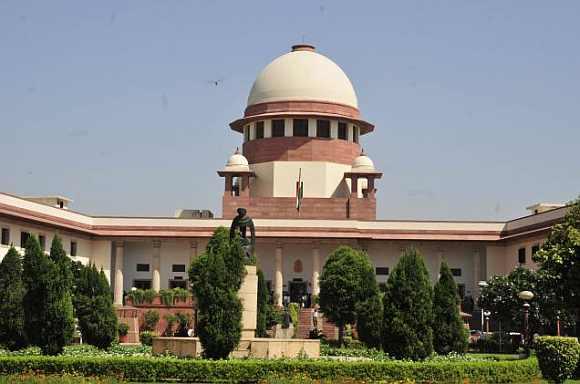
So, there are methods of doing it... People have to try it out in the future. There is another instance available in France. There, normally the regular police investigates but an investigating magistrate or an investigating judge is put in charge.
This is what is being asked for by the petitioners in the coal case. Have a special investigating team. But that can be from case to case.
I would say it is possible for our Supreme Court to do. With the right team it can produce the results. We must go on trying. Instead of doing in case to case basis, the Supreme Court can even evolve a permanent model to follow. The Supreme Court can lay down a mechanism that in this type of cases, if either the CBI or somebody in a writ petition tells us about it, then we have a model and that model will work.
Do you think UPA-2 will proceed as per the court's order to insulate the CBI and make it independent?
That, I don't know. That is guessing. I don't guess on political matters. These are political decisions to be taken by the politicians, what they want to do. But now, on July 5, they are supposed to give a plan. The attorney general will give the plan and then we will judge them.
Whatever churning is going on between the executive and judiciary and CBI, do you see hope?
Oh yes. In a democracy, you have to go on hoping, otherwise how do you go forward? Just see what happened during the Second World War. But for Churchill coming and Chamberlain going, the result of the war might have been different. You should never give up hope and that's the great charm of India.
That you can criticise, you can attack, you can change the government, you can do this and you can do it through the judicial route also. I think we have to hope, if you lose hope, then you don't have a democratic form, then you will be left with a dictatorial form.
...